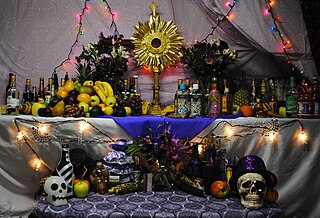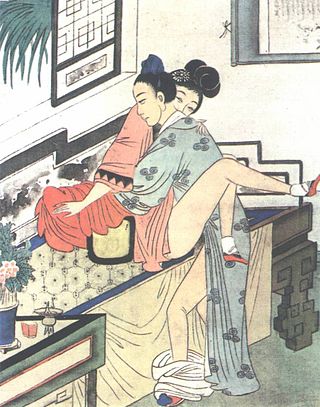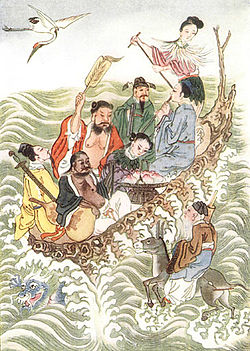The relationship between religion and homosexuality has varied greatly across time and place, within and between different religions and denominations, with regard to different forms of homosexuality and bisexuality. The present-day doctrines of the world's major religions and their denominations differ in their attitudes toward these sexual orientations. Adherence to anti-gay religious beliefs and communities is correlated with the prevalence of emotional distress and suicidality in sexual minority individuals, and is a primary motivation for seeking conversion therapy.

Taoism or Daoism is a diverse philosophical and religious tradition indigenous to China, emphasizing harmony with the Tao—generally understood as an impersonal, enigmatic process of transformation ultimately underlying reality. The concept originates in the Chinese word 道. Although Taoism has no simple definitions, possible translations of Tao include 'way', 'road', and 'technique'. Taoist thought has informed the development of various practices within the Taoist tradition and beyond, including forms of meditation, astrology, qigong, feng shui, and internal alchemy. A common goal of Taoist practice is self-cultivation, a deeper appreciation of the Tao, and more harmonious existence. Taoist ethics vary, but generally emphasize such virtues as effortless action, naturalness, simplicity, and the three treasures of compassion, frugality, and humility.

The Eight Immortals are a group of legendary xian (immortals) in Chinese mythology. Each immortal's power can be transferred to a vessel (法器) that can bestow life or destroy evil. Together, these eight vessels are called the "Covert Eight Immortals" (暗八仙). Most of them are said to have been born in the Tang or Song Dynasty. They are revered by the Taoists and are also a popular element in secular Chinese culture. They are said to live on a group of five islands in the Bohai Sea, which includes Mount Penglai.
Homosexuality has been documented in China since ancient times. According to one study by Bret Hinsch, for some time after the fall of the Han dynasty, homosexuality was widely accepted in China but this has been disputed. Several early Chinese emperors are speculated to have had homosexual relationships accompanied by heterosexual ones.

The following is the timeline of lesbian, gay, bisexual, transgender, and queer (LGBTQ) people's history.

Chinese folk religion comprises a range of traditional religious practices of Han Chinese, including the Chinese diaspora. This includes the veneration of shen (spirits) and ancestors, and worship devoted to deities and immortals, who can be deities of places or natural phenomena, of human behaviour, or founders of family lineages. Stories of these gods are collected into the body of Chinese mythology. By the Song dynasty (960–1279), these practices had been blended with Buddhist, Confucian, and Taoist teachings to form the popular religious system which has lasted in many ways until the present day. The present day government of mainland China, like the imperial dynasties, tolerates popular religious organizations if they bolster social stability but suppresses or persecutes those that they fear would undermine it.

Homosexuality in Haitian Vodou is religiously acceptable and homosexuals are allowed to participate in all religious activities. However, in West African countries with major conservative Christian and Islamic views on LGBTQ people, the attitudes towards them may be less tolerant if not openly hostile and these influences are reflected in African diaspora religions following Atlantic slave trade which includes Haitian Vodou.

Taoist sexual practices are the ways Taoists may practice sexual activity. These practices are also known as "joining energy" or "the joining of the essences". Practitioners believe that by performing these sexual arts, one can stay in good health, and attain longevity or spiritual advancement.
Tu'er Shen, Hu Tianbao or Tu Shen, is a Chinese deity who manages love and sex between men. His name literally means "rabbit deity". His adherents refer to him as Ta Yeh.

A xian is any manner of immortal, mythical being within the Taoist pantheon or Chinese folklore. Xian has often been translated into English as "immortal".
The relationship between transgender people and religion varies widely around the world. Religions range from condemning any gender variance to honoring transgender people as religious leaders. Views within a single religion can vary considerably, as can views between different faiths.

A same-sex relationship is a romantic or sexual relationship between people of the same sex. Same-sex marriage refers to the institutionalized recognition of such relationships in the form of a marriage; civil unions may exist in countries where same-sex marriage does not.

LGBT themes in mythology occur in mythologies and religious narratives that include stories of romantic affection or sexuality between figures of the same sex or that feature divine actions that result in changes in gender. These myths are considered by some modern queer scholars to be forms of lesbian, gay, bisexual, or transgender (LGBT) expression, and modern conceptions of sexuality and gender have been retroactively applied to them. Many mythologies ascribe homosexuality and gender fluidity in humans to the action of gods or of other supernatural interventions.

In Ancient Greek religion and mythology, the Erotes are a collective of winged gods associated with love and sexual intercourse. They are part of Aphrodite's retinue. Erotes is the plural of Eros, who as a singular deity has a more complex mythology.
Greco-Roman mythology features male homosexuality in many of the constituent myths. In addition, there are instances of cross-dressing, androgyny, and other themes which are grouped under the acronym LGBTQ+.
Various LGBT themes are present in different in African diasporic mythologies, primary among them being Voodoo.

In Hindu mythology, there are deities or heroes whose attributes or behavior can be interpreted as lesbian, gay, bisexual, or transgender (LGBTQ) or have elements of gender variance and non-heterosexual sexuality. Traditional Hindu literary sources do not speak of homosexuality directly, but changes of sex, homoerotic encounters, and intersex or third gender characters are often found both in traditional religious narratives such as the Vedas, Mahabharata, Ramayana and Puranas as well as in regional folklore.

The following outline offers an overview and guide to LGBTQ topics:

The roles of women in Taoism have differed from the traditional patriarchy over women in ancient and imperial China. Chinese women had special importance in some Taoist schools that recognized their transcendental abilities to communicate with deities, who frequently granted women with revealed texts and scriptures. Women first came to prominence in the Highest Clarity School, which was founded in the 4th century by a woman, Wei Huacun. The Tang dynasty (618–907) was a highpoint for the importance of Daoist women, when one-third of the Shangqing clergy were women, including many aristocratic Taoist nuns. The number of Taoist women decreased until the 12th century when the Complete Perfection School, which ordained Sun Bu'er as the only woman among its original disciples, put women in positions of power. In the 18th and 19th centuries, women Taoists practiced and discussed nüdan, involving gender-specific practices of breath meditation and visualization. Furthermore, Taoist divinities and cults have long traditions in China, for example, the Queen Mother of the West, the patron of xian immortality, He Xiangu, one of the Eight Immortals, and Mazu, the protectress of sailors and fishermen.
Lord Longyang was the favorite and lover of an unknown king of Wei, often speculated to be either King Anxi or King Jia, during the Warring States period of the Zhou dynasty. Little is known about him outside of his relationship with the king.














